We were picked up on a Sunday morning by one of folks who helps out every now and then. It was a diverse group, quite a few folks from Britain, some Germans, a French guy, an Irish girl and, me, the 13th man. Thirteen in total, some hungover, others wide-eyed at the experience, some thinking “Holy merdeshizen! What have I got myself into?” Barring any sort of Wolf Creek-like experience, we, the intrepid travellers, prepared to “challenge ourselves” and learn all about life on an Australian farm.
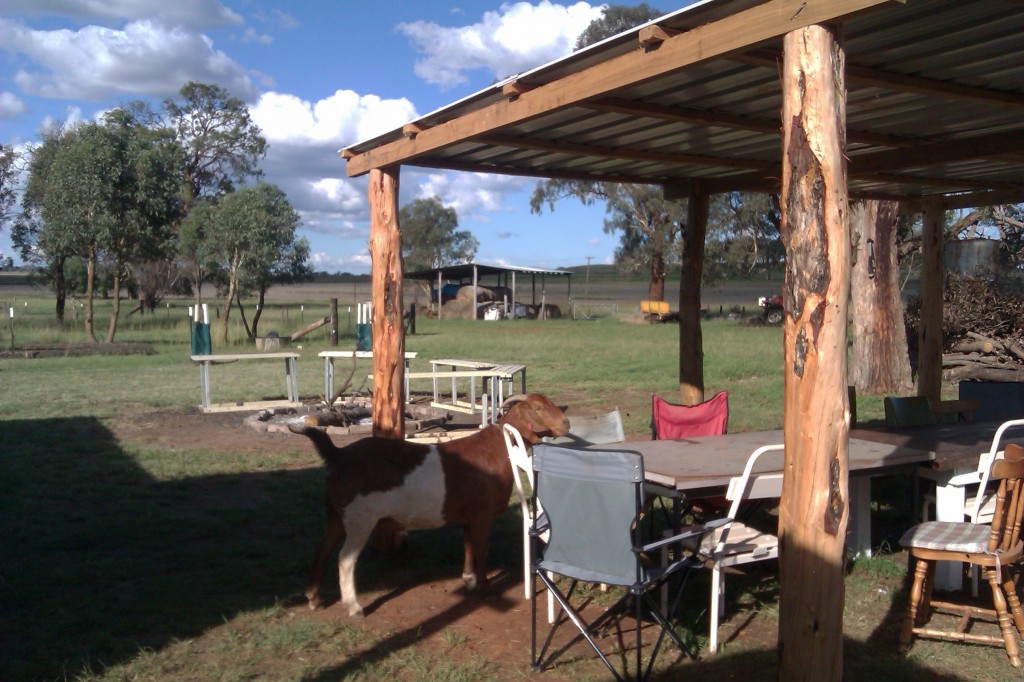
Outbackpackers is a neat idea. Not only is it a clever business on the part of the owner, Mr. Craig Pickett, but it provides a good introduction to life on the farm. Situated just outside of a town called Coonabarabran, the program offers to train folks in a variety of skills such as riding 2- and 4-wheel bikes, mustering sheep (both on horseback and on the bikes), fencing and other assorted tasks. Life on the farm, suffice it to say, can be a challenging experience. My. Picket, despite admitting that farm work is hard and “not for everybody,” is possible to be done. The one thing he drilled into our minds was to “have a go” at whatever was asked and, most of all, “challenge ourselves.” Those two words, “Challenge yourself,” would become a mainstay of the week to come.
The beginning was pleasant enough. We settled in on Sunday afternoon and gathered just before dinner to talk. Mr. Pickett seemed amiable enough. He wanted us to believe that he was 23, but the truth was that he was around 34 or 35. A jokester, to say the least.
After dinner, we assembled in the kitchen area to talk about the week ahead. He told us what was expected of us and how to conduct ourselves (for safety reasons) on the farm. “It can be dangerous if you don’t use your head. A lot of farm work is about common sense.” He’s right, though the common sense of a farmer and the common sense of city folk may, at times, seem not so common at all.
That’s when one of the ladies raised their hands and asked what the numbers at the top of the white board represented
Broken arms – 1 Fall off Horses – 76 Bruises – 136 Cuts – 65
Well, accidents happen and Mr. Picket, either out of some grotesque form of comedy or as a warning, tracks the accidents that happen on the farm. No one has died. To be sure, we all signed waivers agreeing that we wouldn’t hold Outbackpackers and its employees responsible for any injury we incurred while on their property or while participating in the activities. Farming is not a game, you’re using real machines. While challenging yourself, use your common sense.
During his description of the typical farmer in Australia, he mentioned that they were “simple people,” more to do with the fact that the social media amenities (Facebook, Twitter, Youtube) and any number of other digital gadgets were meaningless to most people in the Outback. He made it clear that some placements would be “in the sticks” and out of touch with the rest of the world. He also mentioned that these folks can seem tough on the outside but were, in fact, generally good-natured and well-mannered.
His teaching method, he explained, was “Firm, but fair.” and asked that we call him by name. “Though,” he said, “I go by some other names,” which he wrote on the board. A long list of profanities and insults ended with the simple declaration, “Usually by Tuesday morning.”
With that we parted and went to bed. The day starts early, 6:30 am wake up, by 7 we’re working.
***
The Art of Farming
The course wasn’t so much divided up into sections, but concentrated on a few key skills spread out over the week. There is no set schedule since Mr. Pickett runs a real actual farm and, as a result, work does need to get done. Our week went something like this:
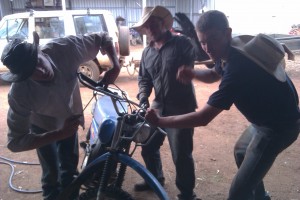
Riding bikes: 2- and 4-wheels. It was eventful enough as the bikes were manual transmission and required a delicate letting-go of the clutch or else the bike would stall and Craig would yell. Same with the 4-wheel bikes (ATVs). Only one lady ran into a pole while a few others wiped out on the road. No harm done. We went for a longer ride through one of the fields in which we were to go up and down hills which further tested the strength of the easy riders.
Tying knots: Probably the most important knot you’ll learn how to tie is the half-hitch which you can use to tie just about anything but, the downside, is that it’s not a very secure knot. We’d also learn the sheep shank which is much more secure. That being the case, on most farms you’ll only have to use those knots if you don’t have a bunch of ratchets on hand. Here’s a video to get you started.
Horse Riding: Learning how to saddle and ride a horse. We began this education in the taming of the great running beast This is when the tears started and Mr. Pickett was called his first name, “Asshole.” Only two girls fell from their horses during the course, a sore back but no broken bones. Later on I’d suggest to save the horses and ride a cowboy, which a few people smiled but many didn’t get it. #fail. We went on an extended horse ride. Now, some of these horses were kinda moody and not particularly pleased with having to lug around more tourists. So, on the ride, they very often tried to run their masters into the overhanging trees. To prevent this, I’m told, you gotta kinda yank their manes away from the trees to teach them who’s boss. Learning how to put a saddle on a horse was interesting enough and not overly complicated, but riding a horse without chaps (leggings) will leave you with hairless and bruised legs.
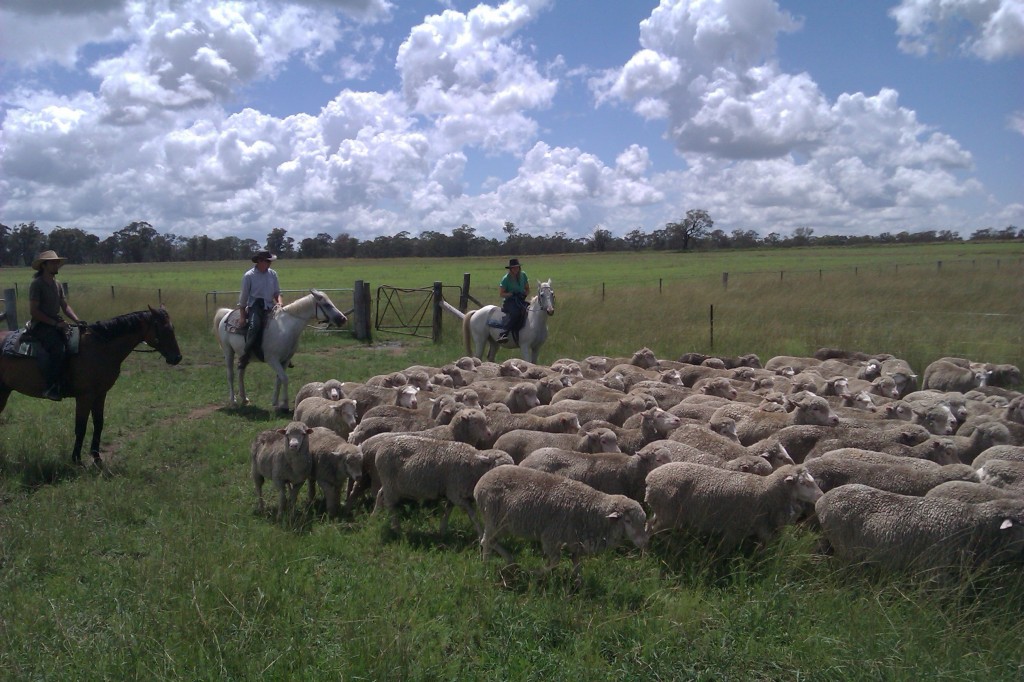
Working with animals: In addition to taming the running beasts of nature, we would also work with steaks and pork chops and sweaters. That is, cattle and sheep. We mustered sheep on horseback from the paddock (“field” in Canadianspeak), drafted and drenched them (drenching is the art of giving a shot of medicine directly into the mouth of the fury little beast, it’s supposed to kill stomach viruses), and treated the fly blown sheep. Treating fly blown sheep is a fun little exercise. Not only does it involve properly drafting the fly blown from the healthy (if you mess up, you gotta run after the sheep and put it into the right yard), it involves sheering the infected area and then painting it with some chemical. It’s hard work and I’m sure we all lost a few pounds after that day. In addition to sheep work, we drafted off cattle before they were carted off to make succulent burgers at the local butchery.
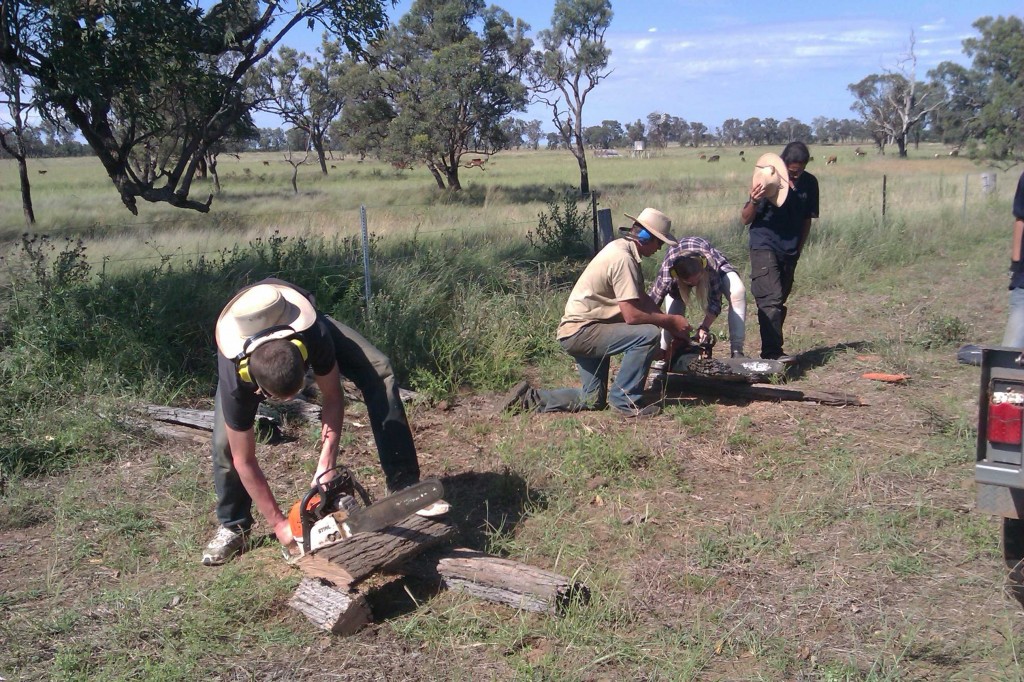
Power tools: Ah, the introduction of power tools, something no teacher ever wants to do. The proper way to start a chainsaw is not on the ground (then dust gets into the blades) not swinging the thing wildly in an attempt to start it (which could hit somebody and cause paper work). The proper way of starting a chainsaw is, first, make sure no one else is standing too close, next, hold the machine firmly in one hand and then pull the chord in a firm but controlled fashion. No one got hurt.
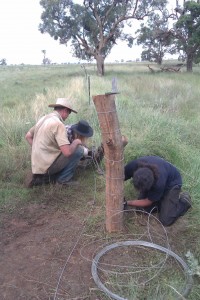
Fencing: Oh fencing, what a wondrous, and plentiful, job that is. Fencing was a pleasure, filled with hauling 80-pound (40 kg) logs and wire. Aside from properly assembling the fence, the most important aspect of fencing is beauty. Huh? Beauty? On a farm? Damn right. Not only does the fence have to be functional by way of keeping the animals in the paddock, it has to look neat and tidy. Mr. PIckett made it quite clear that if it didn’t look good he, like some of the employers we were to work for, would cut it down and tell us to start again. That means the knots have to be tied properly, including both secure and neat, and that the fence posts themselves must be in a straight line. This may seem like a small detail and I may be suggesting that fencing can be an aesthetic thing, but it’s also an important logistical concern. The plain fact is that some farms have large machines on them and these large machines are merciless when it comes to plucking fence posts and wire from the ground. If the fence isn’t straight, you run the risk of ripping out miles of fencing with the tip of a machine. What was clear from the fencing lesson was to take your time and do it right. Make sure your knots are secure and tidy and the fence posts are in a straight line along the edge of the field.
Tractor driving: I’ve now driven tractors on two continents! Go me! Tractor driving (for me) as I wanted to see if Australian tractors were any different from Canadian ones… they’re not. Except Mr. Pickett’s tractor was an older (1990s?) model which had seen quite a few miles by the time I’d stepped inside.
The Great Ute Experience: In between all of this excitement (is that the word to use to describe the horror of farm work?), Mr. Pickett insisted on taking on long rides through the woods in the back of his shitty little ute. And it was a piece of shit. I don’t think it was certified. As a matter of fact, I fully believe the government/outlawed that ute years ago. That being the case, it was a good vehicle to learn how to drive standard (I’d never driven standard before!) and get accustomed to the general condition of farm vehicles.
By Wednesday three folks decided it was best for them not to continue participating in the activities, citing injuries and “It’s not for me.” Mr. Pickett was not pleased. This is the day we’d learn basic mechanics and three of us would try to fix a motorbike, with little success.
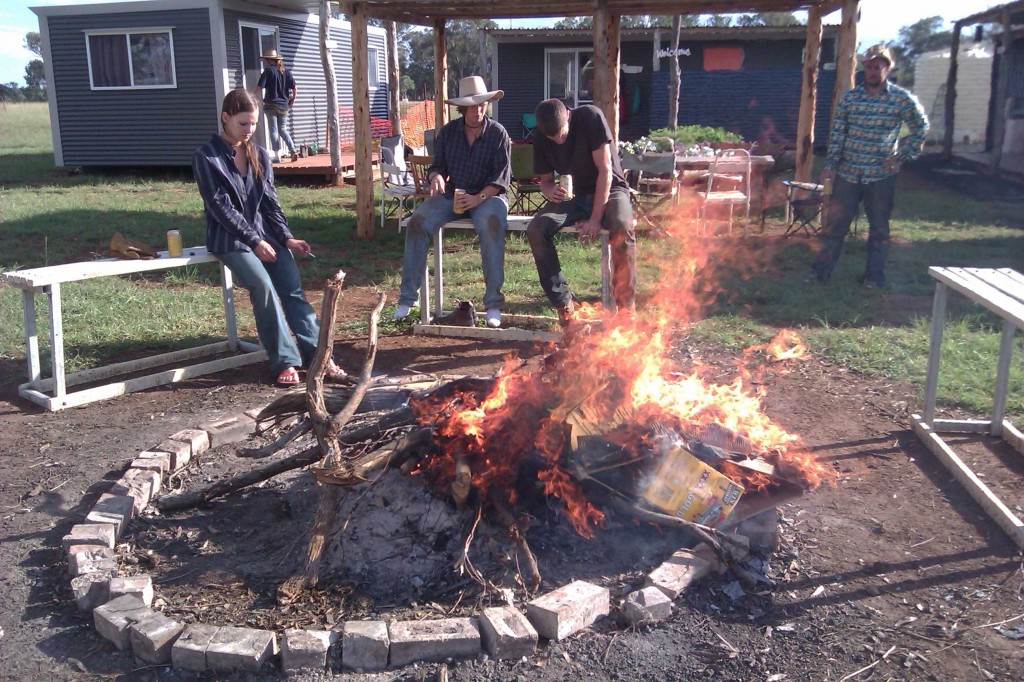
After a day’s work ended, usually around 5 pm, we’d clean up and gather around the bonfire. It was here that we’d discuss the problems we had during the day and ask any question we might have about the theory of farming. Further, any anger at our mistakes that Mr. Pickett exuded during the day had usually dissipated. Amiable conversation ensued while imbibing in a few XXXX’s… that is, beer.
Saturday came and the training course seemed to end as fast as it had begun. Now we were off to Sydney once more to prep for our jobs. By Sunday I’d be on my way to Adelaide to being work as a farm hand and tractor driver for the upcoming grape harvest. I was placed on a farm near a little town called Langhorn Creek. Before that, however, I needed to pass the dreaded interview.
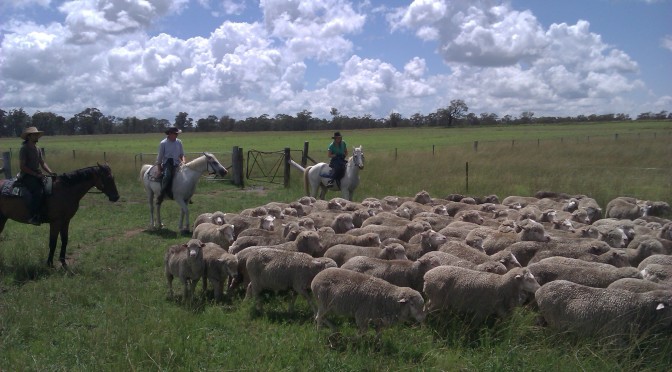
Comments
6 Responses to “Coonabarabran, Australia: Outbackpackers and The Art of Farming”
Hey, the farm training seems to be really adventurous 😉 I’m thinking on doing this training in march. I have a few questions 😉
Do you recommend this farm training? Did anyone fail the training?
I’m kinda worried….whether I get a job or not and if the payment is good or not…
Did the others get good jobs?
thanks 🙂
Hiya Ruthy, thanks for stopping by. To answer your questions, yes, I recommend the farm training if you’re looking to work on farms. It’s beneficial both for its safety lessons and as an introduction to what happens on farms.
No one failed the training, though half of the group decided not to take up farm jobs at the end of the week, citing various reasons, some were simply not interested in that type of work.
Getting a job depends on your attitude and the effort you put in during the training course. Think of the training course as your first interview, your job interview is second.
As for securing a job, Outbackpackers has a network of employers they work with. However, you can often find jobs posted on hostel job boards or by visiting smaller towns and asking around. I’ve written another post on Australian work resources: http://stevensirski.com/australian-work-resources/ And be sure to check the local newspapers for job adverts.
If you’re curious about pay, I don’t think it was all that great. $300/week was what most people were offered, and most places supplied accommodation for a cheap price. I also had use of a vehicle, though I’m sure that was garnished from my wages. I had to buy my own food, too. The best job I heard was one guy getting a job as a welder for $25/hr, and he stayed there for quite a few months. Better money can be made in WA, though you’ll be even more secluded than on the eastern coast.
I hope that helps. Let me know if you have any other questions.
Hi, thank you for your reply 🙂
I’m kinda shocked to read that you only get $300/week and that the wage doesn’t even included room and board.
I suppose there isn’t much money left after paying for room and board. I thought they have a minimum wage for farm job in australia.
Does Outbackpackers only offer you one job? I mean, is it possible to turn down a job offer
if you don’t like it and ask for another one?
Hi Ruthy, it depended a lot on the employer. Some folks included food and accommodation, others didn’t. others “included” it by way of taking it off your wages, thus leaving you with $300 cash at the end of the week. I can’t say whether or not that is the case but it seems so since $300/60hrs/wk = $5/hr, which is far below the minimum wage. As I mentioned before, West Australia has better wages, though those folks like people who have farm experience. This is just from my farm experience and from those I talked to. Outbackpackers has a Facebook page that you could ask around on as well.
And yes, Outbackpackers only offers you one job. If you choose not to take it, you’d better have a good reason. “Not enough money”, I was told, isn’t a good one.
Go with your gut. Farm work isn’t for everybody. You could also go pick fruit, but those wages fluctuate even more.
I hope that helps. Post again if you have any more questions or concerns.
Hello Steven, thanks for all the informations, you have helped me alot!
I’ve decided to do the farm training. It might be a once in a lifetime experience…
I wish you a great time in Australia!
Hi Ruthy, excellent to hear. Enjoy your time and be safe!